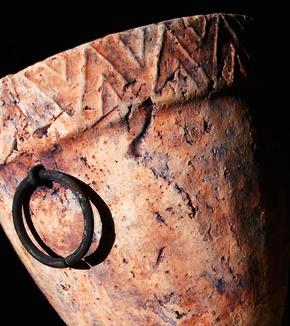 Have you ever felt like a failure? Inadequate? Ineffectual? Have you ever examined your heart and glimpsed sin and darkness and defeat? I have. It is discouraging and demoralizing. It makes me wonder what God sees in me. There is no doubt that I am a flawed vessel. But does that mean that I am a useless vessel?
Have you ever felt like a failure? Inadequate? Ineffectual? Have you ever examined your heart and glimpsed sin and darkness and defeat? I have. It is discouraging and demoralizing. It makes me wonder what God sees in me. There is no doubt that I am a flawed vessel. But does that mean that I am a useless vessel?
Sometimes we try to get around our weaknesses by denying them. Other times we tell ourselves that if we just try harder ... buck up ... pull ourselves up by our bootstraps, then we will succeed; then we will experience victory and conquer the darkness. But these are not the answers I see in Scripture.
In 2 Corinthians 4:6-7, Paul affirms that the treasure of the “light of the knowledge of the glory of God in the face of Christ Jesus” shines in our hearts, which inherently contain darkness. Yet we have this treasure in “jars of clay, to show that the surpassing power belongs to God and not to us.” The place to start, then, is acknowledging that we are frail and damaged—jars of clay that are cracked and worn and easily broken. Weakness is not to be denied. Nor are we to overcome it ourselves. Rather, weakness is to be embraced. Paul actually takes pleasure in and boasts about his infirmities (2 Corinthians 12:9-10). We must recognize the darkness that dwells in our hearts and our failure and inability to overcome it ourselves.
But once acknowledged and recognized, this darkness and these weaknesses become conduits for the brilliant light and overwhelming power of God. The light of God’s glory that shines through the face of Christ can overcome the darkness that lurks in our hearts. His light overpowers and then shines out of our darkness. And the reason Paul takes pleasure in his infirmities is because it is in his weakness that God’s power and strength are made perfect (2 Corinthians 12:9-10). It is because we are frail and feeble jars of clay that any successes or victories more clearly shine as displays of the efficacy of God and the results of the staggering strength of God. They emanate from the surpassing power of God, and not from any inherent strength of our own.
If we wait until we are perfect, until we fix all our cracks, to offer ourselves to God, then we will never do so. But if we offer ourselves to God with all of our frailties and flaws, our damage and darkness, his light will permeate our cracks and then shine through them. He will overcome our brokenness with his strength. We remain jars of clay, but jars of clay are particularly appropriate vessels to highlight the glorious power of God, as they have none of their own.
The refrain in a poem entitled “Anthem” by Leonard Cohen expresses these truths in a particularly evocative and eloquent way:
Ring the bells that still can ring
Forget your perfect offering
There is a crack in everything
That’s how the light gets in.
 Biola University
Biola University


.jpg)
